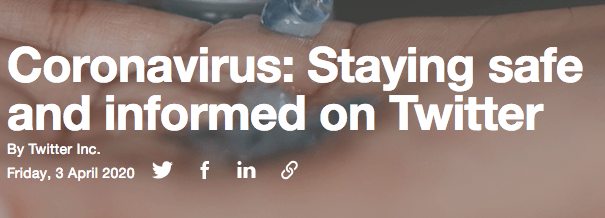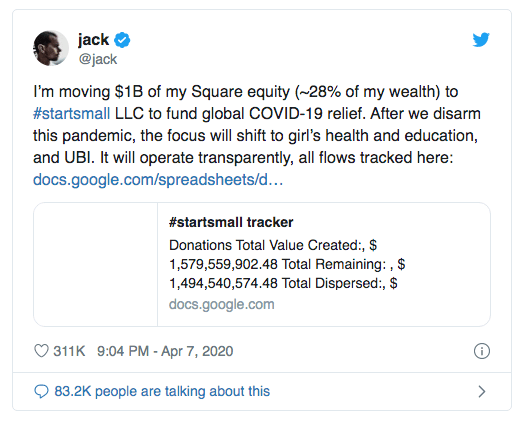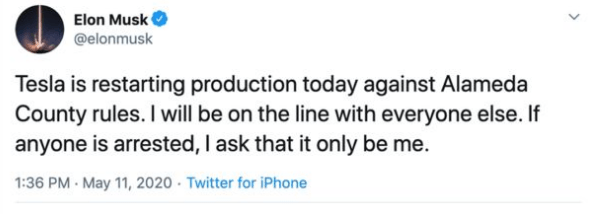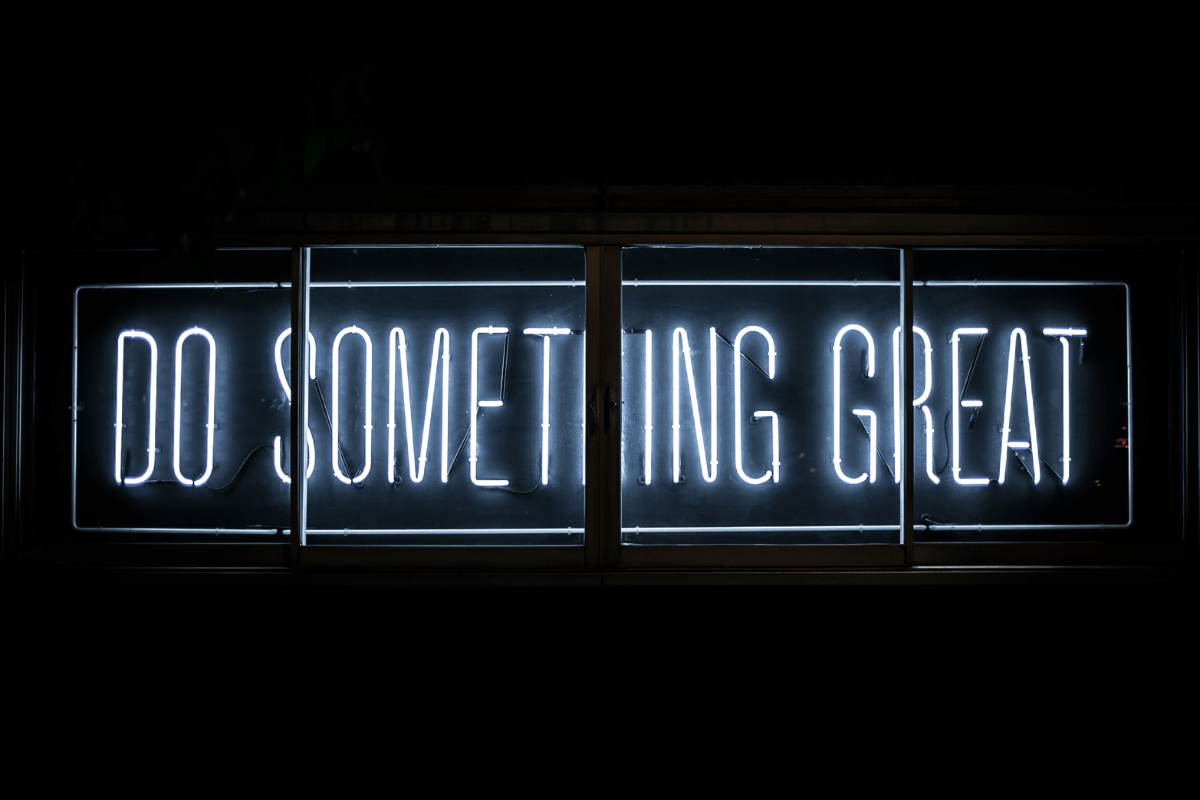Most big tech companies have reacted well to Covid-19 – or at least that’s how it appears from the outside. In March 2020, giants including Apple and Facebook offered to source and donate at least nine million of the protective masks medical workers in hospitals sorely need, while Elon Musk’s Tesla started production on prototype ventilators made from electric car parts.
Twitter made a conscious effort to purge harmful tweets about Covid-19 in late April, updating their approach to ‘misleading information’ on the platform. As of May 2020, they got serious:
“In serving the public conversation, our goal is to make it easy to find credible information on Twitter and to limit the spread of potentially harmful and misleading content. Starting today, we’re introducing new labels and warning messages that will provide additional context and information on some Tweets containing disputed or misleading information related to COVID-19.”
Considering some of the ideas involving “injecting radiation” being floated to fight the virus, this was a welcome intervention.
Were tech companies uniquely placed to deal with the outbreak of Covid-19? Many seem to have adapted to the changes more quickly and easily than traditional counterparts, but is there a particular reason why? Below are some of the major tech companies’ responses to the virus.
Why Are Tech Companies Uniquely Placed to Deal with Covid?

Tech companies didn’t see the pandemic coming; most were caught unawares, and were forced into contingency plans that must’ve been hastily thrown together.
However, they were lucky in a number of respects:
- Staff were likely to have some prior working from home (WFH) experience – less training needed
- With a better understanding of tech and devices, they’re protected against cybercrime
- Most already work on a computer or laptop
- Understanding of collaborative apps
- Often little need for a physical office
- Digital technology has improved to the point where Zoom can replace meetings
- Ability to continue doing business despite the pandemic.
Nevertheless, many companies have still taken a significant hit to revenue, and repercussions for the sector have yet to be fully assessed. This is especially true of business models which involve going outside in any shape or form.
The numbers currently make for stark reading. For example, Uber announced the closure of 45 offices, with 3,000 jobs lost, in addition to 3,700 from a few weeks before. After all, hardly anyone needs to go anywhere. (Unless you really need to test your eyesight.)
In May, Airbnb announced layoffs for roughly 25% of its workforce – 1,900 employees. This also makes sense, the pandemic having completely gutted the travel and hotel sectors.
After the outbreak, a survey found that 38% of tech companies across the UK and Europe are freezing most or all of their tech recruitment during Covid-19, with a 57% drop in the number of permanent tech job listings in London.
The same is true for funding, as almost every business is forced to count costs. Of course, a number of roles will have been switched to WFH only, but the majority have completely disappeared for now, with the sector contracting due to the uncertainty surrounding coronavirus, and with no cure on the horizon.
There have been some tech-sphere winners: think Netflix, or any of the internet providers that have seen a massive surge in user numbers. Almost 16 million people created Netflix accounts in the first three months of 2020; almost double the rate of 2019’s final months.
Similarly, Zoom recently climbed from 10 million daily meeting participants to 300 million in April 2020 – but few other companies have seen such a drastic leap in numbers and overall revenue. Here’s how those which managed to support business as usual have reacted to their difficulties:
Tech Companies’ Covid Responses: Case Studies
Here we outline some of the larger tech companies’ responses to the outbreak, from decisions made regarding workers, to steps taken to implement interim procedures.
Google kept the majority of its international workforce at home following the outbreak – a smart decision, in hindsight.
Contacted by NPR early in May 2020, a Google spokesman said that the majority of employees were likely to be allowed to work remotely until the end of year. In a company meeting, Google CEO Sundar Pichai said those who needed to work in the office could return in June or July, with enhanced safety measures in place.
These plans were clarified on May 26th in a statement by Pichai:
“Because we still expect that most Googlers will be largely working from home for the rest of this year, we’ll be giving each Googler an allowance of $1,000 USD, or the equivalent value in your country, to expense necessary equipment and office furniture. Finally, we continue to experiment with sharing more of our in-office experiences virtually, with a focus on health, wellness, and fun. A couple of examples: fitness with gFit instructors, cooking and nutrition lessons from Google chefs, and Kids@Home Storytime.”
The $1,000 expenses bonus is a nice touch, one sure to help the average worker struggling to make a transition to a home-office lifestyle. The virtual “in-office experiences” sound cringeworthy, but they’re probably helpful for staff who haven’t got used to working alone, and to combat issues like the anxiety which has risen rapidly over the past six months.
Pichai also announced “a new $800+ million commitment to support small- and medium-sized businesses (SMBs), health organizations and governments, and health workers on the frontline of this global pandemic.”
It’s split into $250m in ad grants for the WHO, an investment fund for NGOs and financial institutions, $20m in Google Cloud credits for academics, and amounts employees can give to “organisations in their communities”.
Essentially, the majority of the money is being given away in the form of free credit for Google platforms – slightly different to initial appearances, but positive nonetheless.
Apple

In a positive PR move, Apple committed to making donations of $15m worldwide to help treat sick people and to help “lessen the economic and community impacts of the pandemic”. However, after closing nearly all shops for two weeks in March 2020, it did somewhat cynically reopen in China alone:
“First, I want to recognise Apple’s family in Greater China. Though the rate of infections has dramatically declined, we know COVID-19’s effects are still being strongly felt. I want to express my deep gratitude to our team in China for their determination and spirit. As of today, all of our stores in Greater China have reopened.”
Office staff were asked to work remotely, but shops began to reopen slowly – almost 100 as of May 17th. Drawing on these experiences, Apple now requires face coverings to be worn by all team members and customers, with temperature checks conducted at the door. A number of new deep-cleaning procedures are carried out throughout the day, in addition to changes in interactions with customers:
“In every store, we’re focused on limiting occupancy and giving everybody lots of room, and renewing our focus on one‑on‑one, personalized service at the Genius Bar and throughout the store.”
Given issues with suppliers, Covid has definitely impacted upon Apple’s business, and it could lead to issues with the new iPhone 12, which was set to be released later this year. Regardless, they have enough money/expertise to weather the storm, and seem prepared to reopen as and when.

Social media giant Twitter has taken on the US President in recent weeks, previously releasing a detailed response regarding Covid and its workers on May 12th:
“Twitter was one of the first companies to go to a work from home model in the face of COVID-19, but we don’t anticipate being one of the first to return to offices. We were uniquely positioned to respond quickly and allow folks to work from home given our emphasis on decentralization and supporting a distributed workforce capable of working from anywhere. The past few months have proven we can make that work. So if our employees are in a role and situation that enables them to work from home and they want to continue to do so forever, we will make that happen. If not, our offices will be their warm and welcoming selves, with some additional precautions, when we feel it’s safe to return.”
Offices are intended to stay closed until September at the earliest, with “very few exceptions”.
Twitter CEO Jack Dorsey also committed $1 billion of equity to fund Covid-19 relief worldwide, announced via the platform:

The transparency is a major plus point, and it’s a slightly better deal than Google’s.
Facebook has rightly received bad press for a number of missteps over the years, but their Covid response was reasonable. A spokesman for the company confirmed:
“Facebook has taken the next step in its return to work philosophy. Today, we announced anyone who can do their work remotely can choose to do so through the end of the year, as you can imagine this is an evolving situation as employees and their families make important decisions re returning to work.”
In April, they began asking selected users if they had Covid-19 symptoms – part of a joint effort with Carnegie Mellon University to track the disease’s spread in the UK. The social media giant claims that all info regarding users’ health data will simply be passed on, possibly preempting people’s reasons to be wary.
In a strange move, CEO Mark Zuckerberg laid into rival Twitter late in May, deriding their decision to fact-check content on the platform in the wake of the virus:
“I just believe strongly that Facebook shouldn’t be the arbiter of truth [for] everything that people say online. In general, private companies probably shouldn’t be, especially these platform companies, shouldn’t be in the position of doing that.”
Tesla

Tesla differs in requiring factories and supply lines to be open in order to sell the products that have made them one of the more popular manufacturers in the west.
Typically, Elon Musk took to social media on multiple occasions to voice his concerns about US stay-at-home policies, as if he didn’t have an obvious vested interest in keeping production of his expensive electric vehicles rolling.
Below is Musk’s dismal attempt to at martyrhood, despite being a CEO with a negligible chance of arrest compared to his factories’ average workers:

The company’s behaviour contrasts starkly with the majority of the others listed, mainly because a Tesla vehicle can’t appear out of thin air. Despite these issues, Covid hasn’t stopped recent rumours of a new Tesla factory being opened in the UK, with Bristol touted as a potential location for the “gigafactory”.
Implementing Change in the Long Term
Covid has shaken up many aspects of working life. However, the implementation of simple tech like Zoom is long overdue, while internet speed advances through 4G and fibre connections have made it more viable to communicate online with little lag or delay.
Depending on the nature of the role, smaller companies should be able to replicate the models seen above, but much will depend on operating costs and the nature of the business itself. After all, many tech firms in London and across the country are reeling from the effects of coronavirus, and the end isn’t in sight.
👉 The main question is whether businesses are ready to allow staff to work from home, and what is the endgame of tech used in this way? Even with scant knowledge compared to the average dev, I understand how easily employers could track workers’ productivity when online; a host of apps and services are already available. Imagine a future where your employer tracks your eye movements via laptop cam to ensure you’re keeping up with your workflow, or your four-minute toilet break gets flagged and mentioned in a weekly review where performance is evaluated on the basis of pure numbers.
Google office workers may be immune from such measures, but will the same be true for others lower down the corporate ladder?
Tech Companies and Covid: Final Thoughts
Currently, companies based around physical products are generally suffering, with workers more likely to get sick, and business being lost altogether due to stores’ continued closure.
Tech companies are better off than the likes of airlines and hotels, but their methods and results should be studied carefully by marketers, freelancers, and anyone else who happens to sit in front of a computer as part of their day-to-day working life. Of those listed here, Twitter has had most success acclimatising to changes caused by the pandemic.
But despite certain positive steps, big tech companies aren’t your friends, no matter how much they claim the contrary. Time and again they’ve been proven to be untrustworthy with personal data, and the pandemic is a perfect time to ask for more info, from your whereabouts to those who make up your inner circle.
Should you trust the likes of Twitter to provide informed opinions about the latest news? Their fact-checker makes things slightly easier, but the Zucc made a decent point – one I’ve repeated myself often enough: who gave social media platforms the right to consider themselves arbiters of the truth?
In these testing times, most of us are cutting tech companies more slack – which could easily be exploited by unscrupulous companies and CEOs taking a mile when offered an inch.
If we view their stances cynically, it’s clear they care most about protecting their highly-skilled, difficult-to-replace workforces, and have the budget to provide far greater support than the average cash-strapped small business.
However, small steps like implementing training and procedures to enable staff to work from home will help, while many forms of tech should be embraced because of their clear benefits to staff and the wider environment.
Featured image by Makenna Entrikin on Unsplash



Leave a Reply